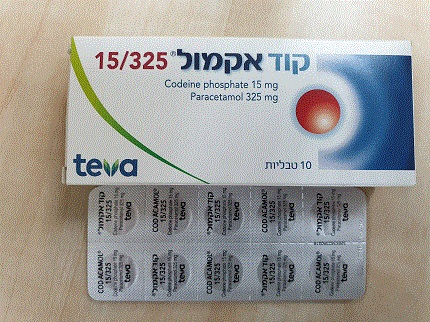Quest for the right Drug

קוד-אקמול 15/325 COD-ACAMOL 15/325 (CODEINE PHOSPHATE, PARACETAMOL)
תרופה במרשם
תרופה בסל
נרקוטיקה
ציטוטוקסיקה
צורת מתן:
פומי : PER OS
צורת מינון:
טבליה : TABLETS
עלון לרופא
מינוניםPosology התוויות
Indications תופעות לוואי
Adverse reactions התוויות נגד
Contraindications אינטראקציות
Interactions מינון יתר
Overdose הריון/הנקה
Pregnancy & Lactation אוכלוסיות מיוחדות
Special populations תכונות פרמקולוגיות
Pharmacological properties מידע רוקחי
Pharmaceutical particulars אזהרת שימוש
Special Warning עלון לרופא
Physicians Leaflet
Overdose : מינון יתר
4.9. Overdose Patients should be informed of the signs and symptoms of overdose and to ensure that family and friends are also aware of these signs and to seek immediate medical help if they occur. Paracetamol Symptoms Symptoms of overdosage with paracetamol in the first 24 hours are pallor, nausea, vomiting, anorexia, and abdominal pain. In 12 to 48 hours liver damage may become apparent, together with abnormalities of glucose metabolism, and metabolic acidosis. Cod Acamol 15/325 tablets MW Feb 2024 Liver damage has occurred in adults taking 10g or more of paracetamol. Excess quantities of a toxic metabolite become irreversibly bound to liver tissue, and immediate treatment is essential. Patients ingesting 7.5g or more of paracetamol in 4 hours should be referred to hospital urgently. Overdose with paracetamol can commonly cause acute hepatic necrosis with severe liver damage and may lead to fulminant hepatic failure, which is usually fatal. In severe overdose hepatic failure may progress to encephalopathy, coma and death. Even in the absence of severe liver damage, acute renal failure due to acute tubular necrosis may develop without hepatic failure. There are no specific early signs of severe poisoning with paracetamol. Consciousness is not usually impaired, and maximum abnormality of liver function tests is delayed for at least three days. Liver damage is caused by conversion of paracetamol to a highly reactive metabolite. Necrosis does not occur unless hepatic glutathione is depleted. Early treatment of paracetamol overdose with agents which facilitate glutathione synthesis, for example N-acetylcysteine and methionine, can prevent liver damage, renal failure, and death. Treatment must be started within 8 to 10 hours, and is not effective if delayed beyond 15 hours. Cardiac arrhythmias and pancreatitis have been reported. Codeine The effects in overdosage will be potentiated by simultaneous ingestion of alcohol and psychotropic drugs. Symptoms Central nervous system depression, including respiratory depression, may develop but is unlikely to be severe unless other sedative agents have been co-ingested, including alcohol, or the overdose is very large. The pupils may be pinpoint in size; nausea and vomiting are common. Hypotension and tachycardia are possible but unlikely. Management This should include general symptomatic and supportive measures including a clear airway and monitoring of vital signs until stable. Consider activated charcoal if an adult presents within one hour of ingestion of more than 350mg or a child more than 5mg/kg. Give naloxone if coma or respiratory depression is present. Naloxone is a competitive antagonist and has a short half-life so large and repeated doses may be required in a seriously poisoned patient. Observe for at least four hours after ingestion or eight hours if a sustained release preparation has been taken.

שימוש לפי פנקס קופ''ח כללית 1994
Mild to moderate pain
תאריך הכללה מקורי בסל
01/01/1995
הגבלות
תרופה שאושרה לשימוש כללי בקופ'ח
מידע נוסף
